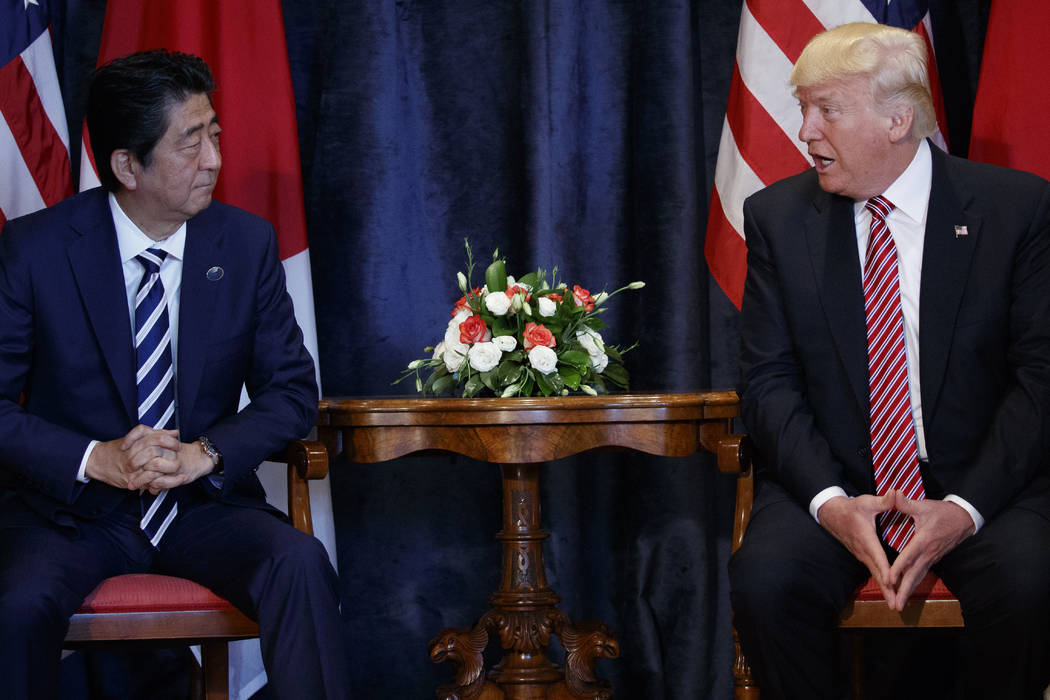Quiet talks on trade, Russia on first day of G7 summit
TAORMINA, Sicily — The last stop on President Donald Trump’s first overseas trip since taking office appeared likely to provide a low-key ending to his hectic tour, as the first day of the two-day Group of Seven nations summit offered more stagecraft than statecraft.
The summit was taking place in a spectacular setting, amid the ruins of Taormina’s Greek Theatre with its spectacular view of Sicily’s Mount Etna, Europe’s most active volcano. That offered abundant photo opportunities as the delegation strolled the picturesque town’s crowded winding streets and stood to watch a nine-jet flyover that left in its wake a contrail of Italian colors.
But whatever substantial discussions that were occurring at the gathering of the leaders and economic officials of the G7 — Canada, the European Union, France, Germany, Italy, Japan, the United Kingdom and the United States – were taking place behind closed doors.
Trump administration officials began to soft pedal any thought that the summit would result in a major agreement even before Air Force One landed in Sicily late Thursday.
“I don’t think you can expect any trade agreement,” Secretary of State Rex Tillerson told reporters. “What there will be is a very frank discussion and exchange on why these trade imbalances exist. Some of it is structural, some of it is fiscal.”
That matched the expectations of Heritage Foundation fellow and former Trump transition team member James Carafano before the trip began.
“Basically what I heard on the G7 was largely a nothing burger,” he said, noting that most policy issues would be aired in bilateral meetings and were unlikely to cause much public stir.
The G-7 summit is the last stop in Trump’s hectic five-stop nine-day tour that began early this week in Saudi Arabia and included visits to Israel and Vatican City – locations pivotal to Islam, Judaism and Christianity.
Trump pivoted to international summitry on the second half of the voyage, beginning with a NATO mini-summit at which he scolded member nations for not paying their “fair share” on defending spending and failed to endorse explicitly Article 5, the charter provision that requires all 28 member nations to consider an attack against one to be an attack against all.
Trump meets Japan’s PM
Before Friday’s G7 meeting began, Trump squeezed in an hourlong meeting with Japanese Prime Minister Shinzo Abe, who paid a visit to the White House in February.
When the press entered the room, Trump said North Korea is “a big problem,” and vowed “it will be solved at some point. It will be solved.”
In a statement after the meeting, the White House announced that Washington and Tokyo agreed to enhance sanctions on North Korea in the wake of the nation’s continued ballistic missile testing, though it provided no details.
In other matters, European Council President Donald Tusk, the political leader of the European Union, urged fellow members to maintain sanctions imposed against Russia in 2014 after Russia annexed Crimea.
As a candidate, Trump said he was open to lifting the sanctions. But after Friday’s meeting, Gary Cohn, Trump’s chief economic adviser, told reporters that was no longer on the table.
“We’re not lowering sanctions on Russia,” he said. “If anything, we would probably look to get tougher on Russia.”
G7 leaders also signed a document at the close of Friday’s meeting at the behest of British Prime Minister Theresa May condemning the Manchester suicide bombing that killed 22 people, including children. It also called on the technology industry to develop tools to help authorities detect terrorist activities and the incitement to violence.
Most of the leaders’ discussions Friday centered on trade issues.
Cohn said Trump realized he needed to explain to the other leaders what he meant by wanting “reciprocal” trade.
“Like reciprocal is, if you’ve got a 30 percent tariff maybe, you know what, we should have a 30 percent tariff, but really you should have a zero tariff,” he said.
No hints on climate change treaty
Hanging over the summit was the 2015 Paris climate change accord.
Trump, who called global warming a “hoax” during the 2016 campaign, is seen as inclined to withdraw the U.S. from the treaty, but newly elected French President Emmanuel Macron and others have pressed Trump to stay. The administration has said Trump will decide after the G7 meeting, although Cohn hinted that could change.
Supporters of the accord argue that it is in American interest to have a seat at the table.
Cohn agrees, but he added that if Paris mandates and the economy collide, “growing our economy is going to win. The president ran on growing our economy.”
Still Cohn declined offers to predict what the president will decide.
“If you know how it’s going to go, then what’s the point?” he said.
Contact Debra J. Saunders at dsaunders@reviewjournal.com or at 202-662-7391. Follow @DebraJSaunders on Twitter.
Trump's itinerary
■ Saturday, May 20: Riyadh, capital of Saudi Arabia
■ Sunday: Riyadh
■ Monday: Jerusalem
■ Tuesday: Bethlehem, Jerusalem
■ Wednesday: Rome
■ Thursday: Brussels
■ Friday: Sicily
■ Saturday: Sicily






















